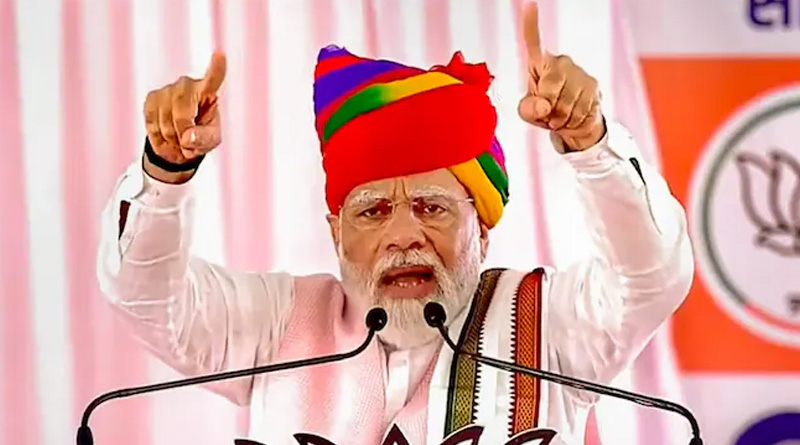


In a scathing attack against the Congress party, Prime Minister Narendra Modi criticized their trend of making unrealizable promises to the public and the subsequent decline in governance and fiscal health in Congress-ruled states. The Prime Minister's remarks came after party chief Mallikarjun Kharge publicly criticized the Karnataka government for reviewing a key guarantee promised by the Congress in their election campaign. PM Modi highlighted the need for leaders to ensure their promises are "fiscally doable", cautioning against the consequences of misleading the public with false commitments.
Background
India's Prime Minister, Narendra Modi, has launched a scathing attack on the main opposition party, the Indian National Congress (INC), accusing them of making unrealistic promises to the public that ultimately lead to poor governance and fiscal instability. PM Modi's remarks come amid a review by the Congress-led Karnataka government of a key election promise, which has drawn criticism from party chief Mallikarjun Kharge.
PM Modi's Criticism
In a speech at a public rally, PM Modi condemned the Congress party's tendency to "promise the moon" to voters during election campaigns, only to fail to deliver on those promises once in power. He pointed to the decline in governance and fiscal health in Congress-ruled states as evidence of this trend.
PM Modi stressed the importance of leaders making promises that are "fiscally doable" and warned against misleading the public with false commitments. He argued that such practices undermine trust in the political system and create a negative impact on the country's economy.
Karnataka Government Promise Review
The immediate trigger for PM Modi's attack was the Karnataka government's decision to review a key election promise made by the Congress party. The promise, to provide 200 units of free electricity per month to all households, has raised concerns about its financial viability.
Congress chief Mallikarjun Kharge has criticized the review, accusing the government of breaking its promise to the public. However, the government has defended its decision, arguing that the promise is unsustainable and would put a strain on the state's finances.
Top 5 FAQs
1. Why is PM Modi criticizing the Congress party? PM Modi is criticizing the Congress party for making unrealistic promises to the public that ultimately lead to poor governance and fiscal instability.
2. What specific promise review triggered PM Modi's attack? The specific promise review that triggered PM Modi's attack was the Karnataka government's decision to review a key election promise to provide 200 units of free electricity per month to all households.
3. What is the Congress party's response to PM Modi's criticism? Congress chief Mallikarjun Kharge has criticized PM Modi's attack, accusing the government of breaking its promise to the public.
4. How has the Congress party's promise-making trend affected the country? PM Modi argues that the Congress party's trend of making unrealistic promises has led to a decline in governance and fiscal health in Congress-ruled states.
5. What does PM Modi believe is the solution to this problem? PM Modi believes that leaders should make promises that are "fiscally doable" and warns against misleading the public with false commitments.

With election results just around the corner, the Union Home Minister has reiterated the BJP's respect for its alliance partners. The decision on forming a government in light of the election outcome will be based on the results and mutually agreed upon by all parties involved. Stay updated with News24 for the latest developments in the political sphere.

In a surprise move, President Donald Trump has commuted the sentence of former U.S. Representative George Santos, who was serving a seven-year prison term for fraud and identity theft. Santos, a New York Republican, admitted to deceiving donors and stealing the identities of 11 people, including family members, to fund his campaign. The decision was announced by Trump on social media, spurring strong reactions from both supporters and critics.

In a significant development, Defence Minister Rajnath Singh inaugurated Hindustan Aeronautics Limited's third production line for the LCA Tejas Mk1A and also witnessed the aircraft's successful maiden flight in Nashik. The event also marked the inauguration of HAL's second production line for the Hindustan Turbo Trainer-40 (HTT-40). With the approval of the purchase of 97 LCA Mark 1A fighter jets, the need for new inductions has been underlined by IAF chief AP Singh, while HAL officials remain confident in meeting this requirement.

In a significant development, over 200 Maoist rebels, including top leaders Rupesh and Ranita, have surrendered to Indian security forces in the Bastar region of Chhattisgarh. This marks a critical moment in the long-standing fight against Naxalism in the country. The region of Abujhmarh and North Bastar, known for its dense forests and difficult terrain, has historically served as a safe haven for Maoist groups, making it challenging for authorities to root out their presence. The massive surrender of Maoists is not only a tactical win but also a symbolic victory in the government's efforts to rid the "Red Corridor" of Naxalite influence.

Amidst his busy schedule, Congress leader Rahul Gandhi is set to make a heartfelt tribute to Zubeen Garg, the beloved singer of Assam, by attending his last rites at 'Zubeen Kshetra' in Sonapur. In anticipation of his arrival, strict security measures have been implemented in the area since morning, with a thorough inspection conducted by Gaurav Gogoi. With the deployment of police, paramilitary forces, and CCTV cameras, all eyes will be on the site to ensure a peaceful and incident-free event.

The Supreme Court has agreed to hear Tamil Nadu Deputy Chief Minister Udhayanidhi Stalin's plea in 2026 to combine and transfer all FIRs and complaints related to his comments on "eradicate Sanatan Dharma" made in 2023. Stalin's lawyer, Mukul Rohatgi, argued that multiple FIRs and complaints had been filed against his client and requested for the matter to be posted in 2026. The top court had previously ordered no new FIRs to be registered against Stalin without its permission, stating that multiple complaints on a single issue were not valid.

President Droupadi Murmu has announced the launch of the Adi Karmayogi Abhiyan, aimed at promoting self-reliance and self-sufficiency in every tribal village. The initiative, organized by the Ministry of Tribal Affairs, is a step towards ensuring that tribal communities are included in the development journey of the nation. The National Conclave on the Adi Karmayogi Abhiyan, held in New Delhi, saw the participation of top government officials and tribal representatives from across the country. The focus of the conclave was on "Tribal Village Vision 2030" and how to implement it for the benefit of tribal communities.

Former Trump administration national security adviser John Bolton has been charged with illegally retaining and sharing classified documents from his time in government. The indictment alleges that Bolton shared more than 1,000 pages of information with relatives through a personal email account, which was hacked by an entity believed to be affiliated with Iran. The case raises questions about the use of the Department of Justice to target political opponents.

US President Donald Trump announced his plans to meet with Russian President Vladimir Putin in Hungary to discuss and potentially end the ongoing war between Russia and Ukraine. Before their meeting, US officials will convene with representatives from Russia to attempt to reach a resolution. This comes after a phone conversation between the two leaders, in which Putin also congratulated Trump on achieving peace in the Middle East. Trump believes this success could have a positive impact on negotiations to end the Russia-Ukraine war.

Jammu and Kashmir Chief Minister Omar Abdullah has made the announcement to revive the historic Darbar Move tradition, which involves shifting government offices biannually between Srinagar and Jammu. The tradition dates back to the 19th-century and was initiated by Maharaja Ranbir Singh to ensure administrative accessibility across the region. The decision to revive Darbar Move reflects an effort to reconnect with the region's rich history while addressing current administrative needs.